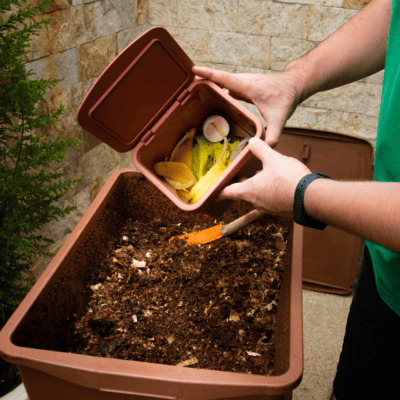Harness the Power of Composting: Boosting Your Missouri Garden with Nutrient-Rich Soil
By: Frisella Nursery
Composting is a simple yet powerful practice that can transform your garden in Missouri. By recycling organic waste, you can create nutrient-rich compost that enriches the soil, improves plant health, and reduces the need for chemical fertilizers. In this article, we’ll explore the numerous benefits of composting and guide you through the steps to create your own compost.

Benefits of Composting:
- Soil Enrichment: Compost acts as a natural soil conditioner, improving its structure, water retention, and nutrient-holding capacity. In Missouri, where soil composition varies across the state, composting can help rejuvenate depleted soils and create an ideal environment for plant growth.
- Nutrient Recycling: Composting allows you to recycle kitchen scraps, yard trimmings, and other organic materials that would otherwise end up in a landfill. By returning these nutrients to the soil, you close the loop and reduce waste, contributing to a more sustainable environment.
- Enhanced Plant Health: Compost enriches the soil with essential micronutrients and beneficial microorganisms, promoting healthy plant growth and disease resistance. The organic matter in compost improves soil structure, aiding root development and moisture retention.
- Water Conservation: Compost helps improve soil structure, allowing it to retain water more effectively. This characteristic is especially valuable in Missouri, where drought conditions can occur during the summer months. By using compost, you can reduce the need for irrigation and conserve water.
- Environmental Impact: By composting organic waste, you reduce the amount of waste sent to landfills, where it decomposes and releases methane, a potent greenhouse gas. Composting instead promotes the production of carbon-rich soil that sequesters carbon dioxide and helps mitigate climate change.
Creating Your Compost:
- Choose a Composting Method: Decide between traditional composting (using a compost bin or heap) or vermicomposting (using worms to break down organic matter). Consider your available space, time, and resources.
- Collect Organic Materials: Gather kitchen scraps like fruit and vegetable peels, coffee grounds, and eggshells. Also, include yard waste such as grass clippings, leaves, and small branches. Avoid meat, dairy products, and oily materials, as they can attract pests.
- Layer and Maintain: Alternate layers of green (nitrogen-rich) and brown (carbon-rich) materials. Greens include fresh grass clippings and kitchen scraps, while browns include dried leaves and small branches. Moisten the pile occasionally and turn it every few weeks to aerate and speed up decomposition.
- Patience and Time: Composting is a natural process that takes time. Depending on factors such as temperature and the materials used, compost can take anywhere from a few months to a year to fully mature. Regularly monitor the pile’s moisture and adjust as needed.
- Use Your Compost: Once your compost has decomposed into dark, crumbly soil, it is ready to be used. Incorporate it into your garden beds as a top dressing, mix it into potting soil, or use it as a mulch around plants to suppress weeds and retain moisture.
Contact Frisella Nursery:
If you have any questions about composting or need further guidance on how to maximize the benefits of compost in your Missouri garden, feel free to reach out to Frisella Nursery. Their team of experts can provide personalized advice and help you make the most of your composting efforts.
Conclusion:
Composting is a sustainable and cost-effective way to improve your garden in Missouri. By composting, you can enrich the soil, reduce waste, conserve water, and promote plant health. Start composting today and witness the remarkable transformation